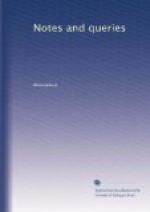QUERIES.
WOOLTON’S CHRISTIAN MANUAL.
One important use, I conceive, of the “NOTES AND QUERIES” is, the opportunity it presents of ascertaining the existence of rare editions of early printed books. Can any of your readers state where a copy or copies of the following may be found?
“The Christian Manuell, or the life and maners of true Christians. A Treatise, wherein is plentifully declared how needeful it is for the servaunts of God to manifest and declare to the world: their faith by their deedes, their words by their work, and their profession by their conversation. Written by Jhon Woolton, Minister of the Gospel, in the cathedral church of Exetor. Imprinted at London by J.C. for Tho. Sturruppe, in Paules Church yarde, at the George, 1576. Dedicated to Sir William Cordell knight, Maister of the Rolles.—At Whymple 20 Nouember 1676. N 7, in eights.”—Copy formerly in the possession of Herbert. (Herbert, Typographical Antiquities, vol. ii. p. 1094.)
There is an imperfect copy, I understand, in the Bodleian. Access to another copy has been needed for an important public object, in order to transcribe the leaf or leaves wanting in the Bodleian copy; and the book, so far as I am aware, does not occur in any other public libraries.
Woolton was nephew to Nowell, author of the Catechisms. He wrote several other pieces, and was Bishop of Exeter 1579-1593. (Wood, Athen. Oxon. ed. Bliss, vol. i. pp. 600, 601.)
T.
Bath, April 9. 1850.
* * * * *
LUTHER’S TRANSLATION OF THE NEW TESTAMENT:—1 JOHN, v. 7.
In an article of the Quarterly Review (vol. xxxiii. p. 78.) on this controverted passage of St. John’s Epistles, generally attributed to the present learned Bishop of Ely, the following statement is made respecting Luther:—
“Let it also be recollected, to the honour of Luther, Bugenhagius, and other leaders of the Reformation, that in this contest they magnanimously stood by the decision of Erasmus. Luther, in his translation of the New Testament, omitted the passage; and, in the preface to the last edition (in 1546) revised by himself, he solemnly requested that his translation should on no account be altered.”
Since such was the injunction of Luther, how does it happen that this verse appears in the later editions of his Testament? I have looked into five or six editions, and have not found the verse in the two earliest. These bear the following titles:—
“Biblia dat ys. de gantze hillige Schrifft verduedeschet dorch Doct. Mart. Luth. Wittemberch. Hans Lufft. 1579.” (in folio.) “Dat Neu Testamente verduedeschet doerch D. Mart. Luth. mit den korten Summarien L. Leonharti Hutteri. Gosslar. In Iahre 1619.”
The verse appears in an edition of his Bible printed at Halle in 1719; in his New Testament, Tubingen, 1793; in one printed at Basel in 1821; and is also to be found in that printed by the Christian Knowledge Society. In the Basel edition the verse is thus given;—




